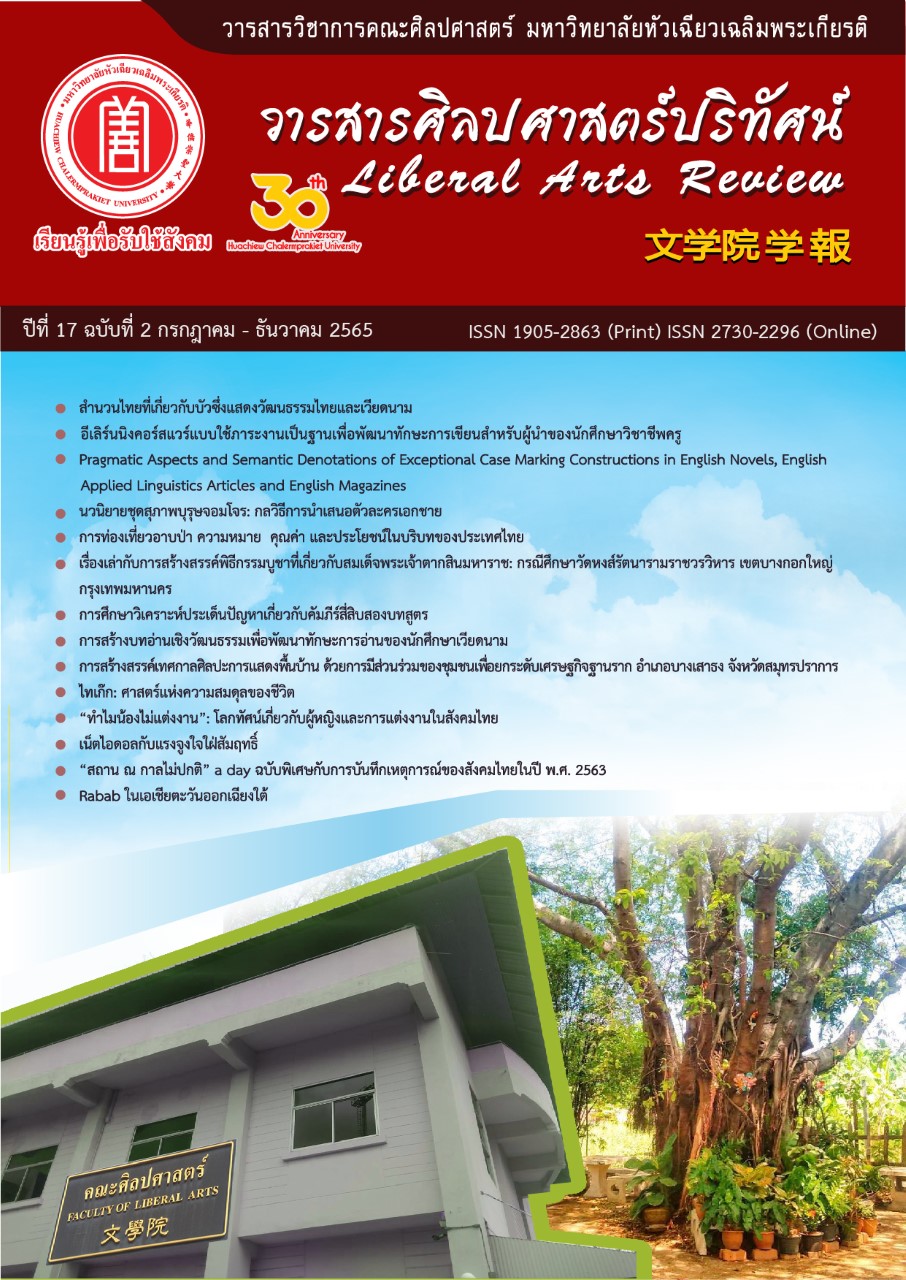A Task-Based E-Learning Courseware to Enhance Pre-Service Teachers' Writing Skills for Leaders
DOI:
https://doi.org/10.14456/lar.2022.12Keywords:
E-Learning Courseware, Writing Skills for Leaders, Online Learning, Task-Based LearningAbstract
The purpose of this research aimed to develop a task-based e-learning courseware to improve pre-service teachers' writing skills for leaders. The following samples were included in this mixed-methods study: 1) ten teachers of Thai learning area or other subject areas, under the Ministry of Education or the Ministry of Higher Education, Science, Research and Innovation, as well as teachers who have taught a Bachelor of Education program in Thai and had at least three years of teaching experience, were selected using a sampling technique known as purposive sampling; 2) ten fourth-year pre-service teachers majoring in Thai language from the Faculty of Humanities and Social Sciences at Bansomdejchaopraya Rajabhat University, who passed a teaching observation and participated in a teaching experiment in schools were selected using purposive sampling; and 3) twenty fourth-year pre-service teachers from the Division of Thai, Faculty of Humanities and Social Sciences at Bansomdejchaopraya Rajabhat University who passed a teaching observation and participated in a teaching experiment in schools as well as enrolling in the Writing for Academic and Professional Communication course (course code 2191104) in the second semester of academic year 2021 were chosen by cluster sampling. The results indicated that 1) the task-based e-learning courseware consisted of three steps: preparing task, practicing task, and post-practicing task; 2) the developed e-learning courseware met the 80/80 benchmark with an efficiency of 86.67/85.13; and 3) the developed e-learning courseware significantly improved pre-service teachers' writing skills for leaders after learning compared to before learning at the .05 level of significance.
References
กฤติยา เรวัติ. (2544). ข้อสังเกตเกี่ยวกับการใช้ทักษะภาษาไทยของนิสิตและทัศนะของนิสิตที่มีต่อการฝึกทักษะภาษาไทย. วารสารศึกษาศึกษาศาสตร์ปริทัศน์, 16(2), 39–43.
เขมณัฏฐ์ มิ่งศิริธรรม. (2559). การออกแบบสื่อการศึกษาสร้างสรรค์. กรุงเทพมหานคร: สำนักพิมพ์แห่งจุฬาลงกรณ์มหาวิทยาลัย.
ชัยวงศ์ พรหมวงศ์. (2545). เอกสารประกอบการสอนชุดวิชาเทคโนโลยีการศึกษา หน่วยที่ 1-5. นนทบุรี: มหาวิทยาลัยสุโขทัยธรรมาธิราช.
นพมณี ฤทธิกุลสิทธิชัย. (2554). การพัฒนารูปแบบการเรียนการสอนภาษาอังกฤษตามแนวการสอนเน้นเนื้อหาและการปฏิบัติภาระงานเพื่อเสริมสร้างความสามารถในการอ่านภาษาอังกฤษเพื่อความเข้าใจและการปฏิบัติภาระงานของนักศึกษาวิศวกรรมศาสตร์ (ดุษฎีนิพนธ์ปริญญาดุษฎีบัณฑิต). กรุงเทพมหานคร: คณะครุศาสตร์ จุฬาลงกรณ์มหาวิทยาลัย.
ภัทธิรา ธีรสวัสดิ์. (2556). การพัฒนาสื่อบทเรียนลิเล็กทรอนิกส์ : การจัดการสื่อสาร. กรุงเทพฯ : วิทยาลัยนวัตกรรมสื่อสารสังคม มหาวิทยาลัยศรีนครินทรวิโรฒ.
ราชกิจจานุเบกษา. (2553, 22 กรกฎาคม). พระราชบัญญัติการศึกษาแห่งชาติ (ฉบับที่ 3) พุทธศักราช 2553. ค้นคืนจาก http://www.ratchakitcha.soc.go.th/DATA/PDF/2553/A/045/1.PDF.
ราชกิจจานุเบกษา. (2563, 7 พฤษภาคม). ประกาศคณะกรรมการคุรุสภา เรื่อง รายละเอียดของมาตรฐานความรู้และประสบการณ์วิชาชีพครูตามข้อบังคับคุรุสภา ว่าด้วยมาตรฐานวิชาชีพ (ฉบับที่ 4) พ.ศ. 2562. ค้นคืนจาก http://www.ratchakitcha.soc.go.th/DATA/PDF/2563/E/109/T_0010.PDF.
ฤดี กมลสวัสดิ์. (2560). สื่อการเรียนการสอนสำหรับครูภาษาไทยยุคใหม่. กรุงเทพมหานคร: โรงพิมพ์มหาวิทยาลัยราชภัฏบ้านสมเด็จเจ้าพระยา.
วัชรพล วิบูลยศริน. (2556). นวัตกรรมและสื่อการเรียนการสอนภาษาไทย. กรุงเทพมหานคร: สำนักพิมพ์แห่งจุฬาลงกรณ์มหาวิทยาลัย.
วาสนา จันทร์ลา และเยาวลักษณ์ พิพัฒน์จำเริญกุล. (2562). การพัฒนาอีเลิร์นนิงคอร์สแวร์ด้วยการถอดบทเรียนหลังปฏิบัติการของนักเรียนชั้นมัธยมศึกษาปีที่ 2. วารสารครุศาสตร์ปริทรรศน์ มหาวิทยาลัยมหาจุฬาลงกรณ์ราชวิทยาลัย, 6(2), 55-66.
สุวัฒน์ บรรลือ. (2561). รูปแบบการจัดการเรียนการสอนออนไลน์ที่เหมาะสมสำหรับมหาวิทยาลัยราชภัฏอุบลราชธานี. วารสารมหาวิทยาลัยราชภัฏร้อยเอ็ด, 11(2), 250–256.
สุวิมล มธุรส. (2564). การจัดการศึกษาในระบบออนไลน์ในยุค NEW NORMAL COVID-19. วารสารรัชต์ภาคย์, 15(40), 33–42.
อชิตพล มีมุ้ย. (2564). การพัฒนาอีเลิร์นนิงคอร์สแวร์แบบผสมผสานตามแนวคิดห้องเรียนกลับด้านเพื่อสร้างเสริมทักษะการเรียนรู้ด้วยตนเองสำหรับนักศึกษาระดับปริญญาตรี สถาบันอุดมศึกษาเอกชนในประเทศไทย. พุทธมัคค์, 6(2), 30–41.
Azlan, N. A. B., Zakaria, S. B., & Yunus, M. M. (2019). Integrative task-based learning: Developing speaking skill and increase motivation via Instagram. International Journal of Academic Research in Business and Social Sciences, 9(1), 620–636.
Creswell, J. W., & Creswell, J. D. (2018). Research design: qualitative, quantitative, and mixed methods approaches (5th ed.). Los Angeles: SAGE.
Ellis, R. (2003). Task-based Language Learning. Oxford: Oxford University Press.
Gustafson, K. L. & Branch, R. M. (2002). Survey of instructional development models, ERIC. Retrieved from http://www. eric.ed.gov.
Klement, M., & Dostal, J. (2014). Students and e-learning: A longitudinal research study into university students` opinions on e-learning. Procedia - Social and Behavioral Sciences, 112, 175–180.
Lee, L. (2016). Autonomous learning through task-based instruction in fully online language courses. Language Learning and Technology, 20(2), 81–97.
McGriff, S. J. (2003). Instructional system design (ISD): Using the ADDIE model. Retrieved from http://metalab.uniten.edu.my/~iskandar/ project/july%2009/ADDIE.pdf.
Nunan, D. (2004). Task-based language teaching. Cambridge: Cambridge University Press.
Prabhu, N. S. (1979). Communicative syllabus design and methodology. Oxford: Oxford University Press.
Rahman, M. (2011). Teaching oral communication skills: A task-based approach. ESP World, 1(27), 1–11.
Waldman, K. (2016). 6 ways leaders can improve their writing. Retrieved from https://www.govloop.com/community/blog/6-ways leaders-can-improve-writing.
Willis, J. (1996). A Framework for task- based learning. London: Longman.
Downloads
Published
How to Cite
Issue
Section
License
Copyright (c) 2022 Liberal Arts Review

This work is licensed under a Creative Commons Attribution-NonCommercial-NoDerivatives 4.0 International License.
บทความที่ได้รับการตีพิมพ์เป็นลิขสิทธิ์ของวารสารศิลปศาสตร์วิชาการและวิจัย
ข้อความที่ปรากฏในบทความแต่ละเรื่องในวารสารวิชาการเล่มนี้เป็นความคิดเห็นส่วนตัวของผู้เขียนแต่ละท่านไม่เกี่ยวข้องกับมหาวิทยาลัยหัวเฉียวเฉลิมพระเกียรติ และคณาจารย์ท่านอื่นๆ ในมหาวิทยาลัยฯ แต่อย่างใด ความรับผิดชอบองค์ประกอบทั้งหมดของบทความแต่ละเรื่องเป็นของผู้เขียนแต่ละท่าน หากมีความผิดพลาดใดๆ ผู้เขียนแต่ละท่านจะรับผิดชอบบทความของตนเองแต่ผู้เดียว




